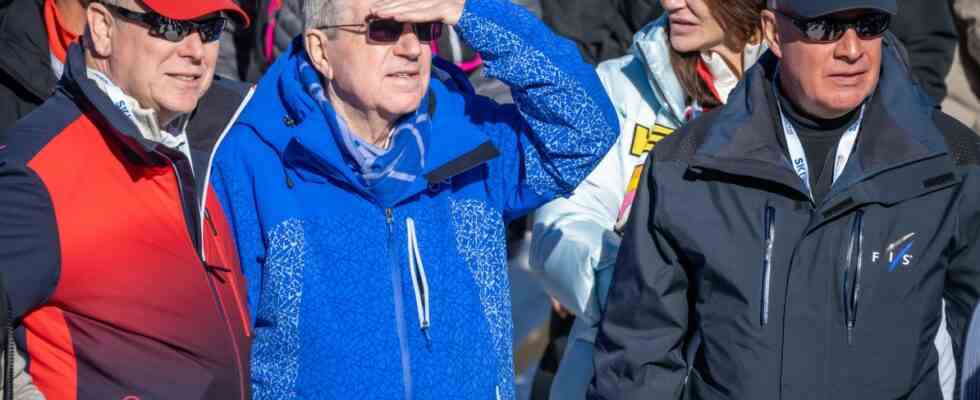A few days ago, the Ukrainian Ivan Kovbasnyuk stood in the Courchevel finish area and spoke about ski racing in times of war. He said he serves in the army but is currently off duty as a top athlete. As soon as the Alpine World Ski Championships are over, he expects to be called to the front. So there, where family and friends have been dying for a year, sports facilities have been bombed by Russian forces.
On Sunday, Thomas Bach, the German President of the International Olympic Committee (IOC), then crossed the finish line in Courchevel, with his back to the grandstand, which was smoldering with joy at the forthcoming men’s downhill. There was something surreal when a Ukrainian reporter confronted him with Kovbasnyuk’s story, including his statement that Russian athletes should remain banned from international competitions because they silently supported Vladimir Putin’s course. One understands the suffering, supports Ukraine where possible, Bach replied. Then he added that they are also committed to the Olympic peacekeeping mission. And, according to Bach, it has always been intended to allow athletes from the country of a warmonger – albeit without flags, anthems and other insignia, as the IOC is now planning with Russia.
Balancing act: Ukrainian Ivan Kovbasnyuk tries to focus on downhill racing while friends and family die back home.
(Photo: Daniel Goetzhaber/Gepa/Imago)
One of the great stories of the sports politician Bach was always that sports and politics should be strictly separated. What nonsense that is has been shown above all by Bach and Putin over the years. Russia permeated the sport with money and officials like a capillary system.
In return, the country and athletes enjoyed conspicuous criminal protections, even as Russia launched a state doping program and soldiers prepared to invade Crimea, while Bach and Putin toasted each other at the 2014 Winter Olympics in Sochi. But now that the country has unleashed another war of aggression, even Bach, the mastermind, is in danger of slipping out of control.
As much as Bach recently trimmed organized sport into line, the opposition formed in politics. Anne Hidalgo, the mayor of Paris and host of the upcoming Summer Games, recently spoke out strictly against allowing athletes from Russia and Belarus to play in Paris in 2024. Last Friday, politicians from more than 30 countries agreed fundamentally to oppose the participation of these athletes in Paris.
The list of participants ranged from the USA, Japan, South Korea, Australia and New Zealand to European representatives such as Germany, England and France. A resolution is expected by the end of this week. “As long as Putin continues his barbaric war, Russia and Belarus must not be represented at the Olympics,” Britain’s Culture Minister Lucy Frazer tweeted.
The IOC refuses any interference from politics – and interferes there itself
Now we can hear from Berlin that not all states are pushing so decisively in this direction. For the IOC, the alliance is explosive in one way or another. Once a position against Olympus has been established, it threatens to become isolated – and could eventually endanger its lifelines: the donations from sponsors, TV and the public.
Bach reacted correspondingly nervously in Courchevel. “In the end, it’s not up to governments to decide who takes part in sporting events,” he said. That would be “the end” of these major events. However, nobody in politics intends to do that. The IOC merely requests this, just as the IOC repeatedly makes demands on politicians or pulls the strings in the background, be it with anti-doping laws or when state investigators wade through the Olympic swamp.
Speaking of demands: The Mirror now reported on a letter that the IOC recently hastily sent to the National Olympic Committees from the around 30 countries concerned. IOC Director James Macleod accused the politicians of making false statements without citing examples. In any case, the IOC asked its NOCs to influence the politicians so that they did not sign the resolution or take the “position of the Olympic movement” into account. The DOSB, the NOK responsible for Germany, said on request that the mail from the IOC had not been received, not even in the spam folder. So far, there has also been no exchange of views with German politicians on this conference.
Meanwhile, Bach continued his Olympic egg dance in France. He asked why tennis players from Russia and Belarus were last allowed to compete at the Australian Open, but not Russian swimmers or gymnasts at international competitions. He did not mention that Ukrainian athletes had been provoked with Russian flags in Melbourne, nor the icy silence between athletes from both countries. Why, one could just as well ask, is tennis not possible to do what large parts of the rest of the sporting world do?
Bach continued to lament that it was difficult to refuse athletes participation, it was a fundamental human right. It’s exciting how much the IOC suddenly discovers its soft spot for the human rights charter as soon as it’s not doing business with potentates. When the IOC last visited Beijing, Bach had long managed not to even mention the Uyghurs, who are committing blatant human rights violations in China. Later he took refuge in the phrase that sport cannot solve the problems of world politics.
A thesis with which Bach underscored his lecture in Courchevel is all the more bizarre. “History will show who does more for peace – those who want to communicate or those who want to isolate or divide,” he said. As if Russia weren’t the problem, which is obviously calling on its athletes to support the war; that has been using their successes in sport as a social cement for years. In Bach’s world, the problem seems to be those who support a country that doesn’t want to compete against athletes from the country of the aggressor. While the athletes of the attacked country may soon be fighting at the front, like downhill skier Ivan Kovbasnyuk.

